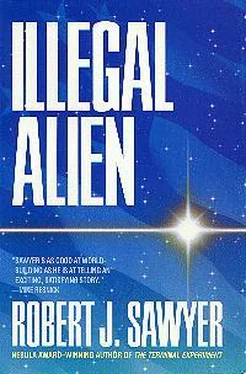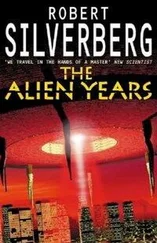“There’s been a lot of talk about what will happen if you are found guilty.”
“I am given to understand that I may die,” said Hask.
Barbara Walters pursed her thin lips, apparently disturbed by the baldness of the statement. “I mean, what will happen to Earth? What response will your government have?”
“It would be in my own interest to tell you that my people would descend on Earth and, because of the execution of one of their own, would wipe your planet clean of life.” He paused. “Or I could simply tell you that the execution of me would result in the Tosoks leaving, never to return—a cutting off of all contact. But neither of these things is true, and so I will not claim them. As a people, the Tosoks believe in predestination. If it is my fate to be punished for a crime I did not commit, they will accept that. But I tell you, Ms. Walters, I did not kill Cletus Calhoun—why would I? He was my friend. If I am found guilty, it will be an error, for I did not commit this crime.”
“You’re saying we must find you innocent, then?”
“You will find me whatever God intends you to. But I am innocent.”
Dale smiled broadly. Hask couldn’t have done better.
“Kelkad!” shouted a man from the Los Angeles Times as Dale, Hask, and Kelkad left the ABC studios. “Kelkad! What did you think of tonight’s broadcast?”
Captain Kelkad had his front hand up to shield his forward-looking pink and yellow eyes from the glare of the lights. “I thought my crew member presented himself well,” he said.
The crush of reporters was overwhelming, but police were doing their best to keep them back.
“Kelkad,” shouted a woman from CNN, “if Hask is found guilty, will your own people punish him as well?”
Kelkad continued to move forward through the crowd. “We would have to conduct our own investigation of the matter, of course.”
“What have you done yourself about the murder?” shouted a woman from the CBC.
Kelkad paused, as if considering whether to answer. “I suppose there no reason not to tell you. I have, of course, made a full report to my home world via radio. I told them earlier that we found intelligent life on Earth, and have now supplemented that report with news that one of our team has been apprehended, and is facing execution for a crime he denies having committed.”
“How long will it take to get a reply?” asked a man from CBS.
Kelkad’s tuft moved in an odd way, as if surprised that anyone covering this story could be unaware of the basic scientific truths involved. “Alpha Centauri is 4.3 of your light-years from here. It will take, therefore, 4.3 Earth years for my report to arrive, and another 4.3 Earth years for any reply to be received. Obviously.”
A man with a European accent jostled to the front of the crowd. “It’s been over two centuries since you left your home world. What response will they make?”
The alien captain considered this for quite some time. Finally, his tuft parted in the center, a gesture that the public had learned by now was the Tosok equivalent of a shrug. “I have no idea,” he said.
During pretrial discovery, the prosecution and the defense each had to share the evidence it intended to present at trial so that adequate study of it and response could be made. After the final discovery meeting, an exhausted Dale Rice returned to his office and sat down in his big leather chair. He rubbed the broken bridge of his nose between his thumb and forefinger, trying to fight off a headache. After a moment he picked up his desk phone, selected a line, and punched out the number of Frank’s cellular.
The moment Frank Nobilio entered Dale Rice’s private office, he felt his eyebrows drawing together. Frank had never seen the old attorney look so upset before. Dale’s face was normally quite smooth—surprisingly so for a man his age—but deep worry lines creased his forehead. “What is it?” asked Frank, taking his usual seat.
“I don’t think there’s much question anymore,” said Dale. “I think our boy did it. I think Hask killed Calhoun.”
“I don’t believe it.”
“Politely, it doesn’t matter what you believe. It doesn’t even matter what I believe, for that matter. Only thing that matters what a jury’ll believe.”
“So, if the jury is likely to find Hask guilty, what do we do?” asked Frank.
He felt nauseous.
“Well, the DA is going to seek a murder-one conviction. That’s murder in the first degree—premeditated murder. We could get our alien gentleman to confess to murder-two instead.”
“Which is?”
“Second degree. Yes, he killed Dr. Calhoun, and, yes, he meant to. But it wasn’t planned in advance. An argument that got out of hand, something like that. But even a second-degree conviction carries a mandatory sentence of fifteen years.”
“No,” said Frank, shaking his head. “No, that’s not acceptable.”
“Or we try to get the DA to come down to involuntary manslaughter. That means it was a criminal death, but Hask never intended to do it. Calhoun died because his leg was cleanly severed from his body. Say Hask did that without knowing it would be fatal—the fact that Calhoun died makes it a crime, but it isn’t murder.”
“But he’d still go to jail.”
“Possibly.”
“Any other options?”
“There are only two possible approaches that let Hask walk. First, there’s self-defense. But you can only legally use deadly force in self-defense if deadly force is being used against you. Calhoun had to have been threatening Hask in such a way that Hask felt he was in immediate danger of being killed.”
“I can’t believe Cletus Calhoun was threatening an alien.”
“Don’t dismiss this so fast, Frank. There are possibilities here. Say Calhoun wanted to—I don’t know—say he wanted to thump Hask on the back, all friendly-like, but being hit there, say that’s fatal to a Tosok. Hask might have thought he was in imminent danger of being killed, and so responded with deadly force.”
“It seems unlikely. Why wouldn’t he have told us if that were the case?”
“I don’t know.”
“You said there’s another possible defense.”
Dale nodded. “Insanity.”
“Insanity,” repeated Frank, as though he’d never heard the word before.
“That’s right. We prove that, by human standards, Hask is non compos mentis .”
“Can you do that?”
“I don’t know. It may be that all Tosoks are bonkers by human standards. But if he did it, and it wasn’t self-defense, pleading insanity is the only thing that will get him off.”
“It’s an interesting approach.”
“That it is, but the insanity defense is used in less than one percent of all criminal cases. And of those, only fifteen percent are murder cases. In all cases, the insanity defense works—that is, results in an acquittal—only about twenty-five percent of the time.”
“So it’s not an easy out?” asked Frank.
“No—despite what the media claims. Eighty-nine percent of those who are acquitted under an insanity defense are done so because they’ve been diagnosed as being either mentally retarded, or having a severe mental illness, such as schizophrenia. Eighty-two percent of acquittees have already been hospitalized at least once for mental problems.”
“Wait a minute—did you say mentally retarded?”
Dale moved his massive head in a slow nod.
“Is there a legal definition for that?”
“Doubtlessly. I can get my clerk to check.”
“ ’Cause if it’s a matter of IQ, you know, they often charge that IQ tests are culturally biased. If Hask gets a really low score on a standard IQ test, he could qualify as retarded.”
Читать дальше











